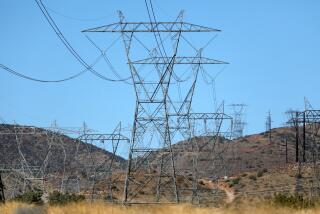Bounce a Check? No Problem; Fees in California Among Lowest in U.S.
- Share via
If your check bounces, you’ll probably have to pay your bank $10 to $12 as a fee for handling it. Some might call it a penalty.
But take heart. You’d pay a lot more everywhere else in the country, except New York City, according to a survey by an industry newsletter.
The survey by Bank Rate Monitor shows that fees charged by major banks and savings and loans for bounced checks have increased nationwide to an average of $16.13 this year from $15.30 two years ago.
“This is what I call the creeping, crawling, silent world of rising banking fees for checking accounts, which are the mainstay account for most Americans,” said Robert K. Heady, publisher of the weekly newsletter.
He cited three reasons for higher fees to handle checks written on accounts with non-sufficient funds, so-called NSF checks: increased competition among banks, higher costs and a wider availability of overdraft protection.
Overdraft protection, which works like a credit card, gives account holders an automatic loan when a check exceeds the amount remaining in an account.
The survey of bounced-check fees comes from information supplied to Bank Rate Monitor from the 10 largest banks in the 10 largest metropolitan areas, including the Los Angeles-Orange County area and San Francisco.
While fees at major California banks have remained in the $10 to $12 range, some banks assess a stiffer penalty, according to a check of Orange County’s larger banks and S&Ls.;
Eldorado Bank in Tustin, for instance, charges $18 for handling a check returned for non-sufficient funds. El Camino Bank in Anaheim charges $15.
It could be worse. In Philadelphia, the major financial institutions charge $30 for a bad check, according to Bank Rate Monitor. At the other end, New York City’s major banks assess the nation’s lowest fees--$8 to $9.50 per bounced check.
Fees for bad checks have remained low at California banks because of litigation against a host of banks, including some of the state’s largest, according to Heady.
The litigation, filed in 1977, accused the banks of gouging the public with excessive fees. The major banks that were sued, Bank of America and Wells Fargo, settled last year with agreements to limit increases for two years. The case is pending against other large banks.
David B. Baum, a San Francisco lawyer who took part in the litigation, said experts in the case disagreed over how much it costs a bank to process a bounced check. Bankers generally argued that the true cost includes overhead--salaries, computer time and so forth. Other experts testified in the litigation that the cost was no more than 50 cents to $1 per item, he said.
J.B. Crowell, president of Eldorado Bank, said overhead has to be included in the cost of processing checks written on insufficient funds.
His bank’s $18 fee hardly covers the cost of handling a bounced check, he said. Besides, Crowell said, the bank’s 17.9% credit card interest rate, which affects more customers, is much lower than the rates at major institutions.
Wells Fargo has followed Bank of America in adopting a tiered-fee system by charging $10 for one returned check and up to $30 for three NSF checks on the same day. In addition, a fourth NSF check costs the customer $15 with a $45 daily maximum.
BOUNCED CHECK FEES
Institution Maker’ Depositor’s Account Account American Savings & Loan $10 $10 Bank of America* $10-15 $3 Beverly Hills Savings & Loan $10 $5 Citizen’s Bank of Costa Mesa $10 $2.50 Commerce Bank $12 $3 Downey Savings & Loan $10 $3 El Camino Bank $15 $5 Eldorado Bank $18 $4 Farwest Savings & Loan $10 $5 First Interstate Bank $10 $4 Household Bank $10 $5 Mariner’s Bank $12 $3 Mercury Savings $10 $3 Newport Balboa Savings $10 $5 Pioneer Bank $15 $5 Security Pacific National Bank $10 $4 Wells Fargo Bank $15 $3 Western Financial Savings Bank na $10
*Bank of America charges $10 for the first three checks and $15 for every subsequent bounced check.
Source: Researched by Dallas M. Jackson
More to Read
Inside the business of entertainment
The Wide Shot brings you news, analysis and insights on everything from streaming wars to production — and what it all means for the future.
You may occasionally receive promotional content from the Los Angeles Times.










